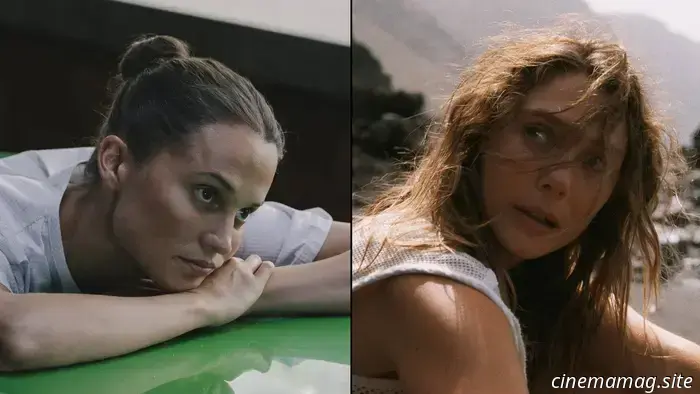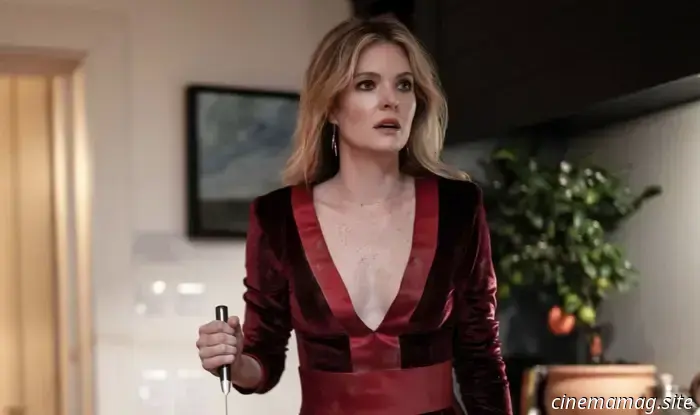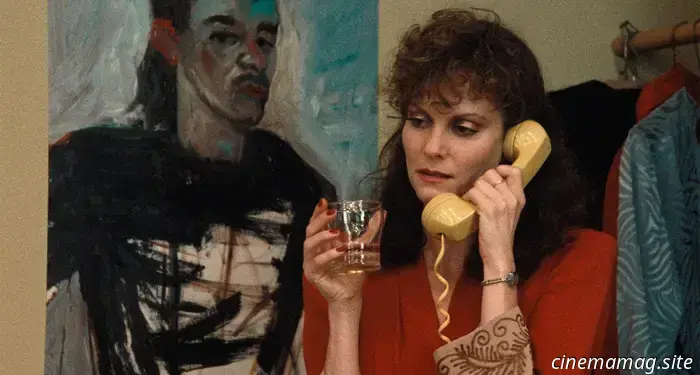
Alicia Vikander and Elizabeth Olsen Discuss The Evaluation, Culinary Battles, and the Reflection of Contemporary Issues in Sci-Fi
Science fiction serves as an ideal space to reflect on the current state of our world through exaggerated circumstances. The future presents a rich canvas to take a contemporary issue, modify it slightly, and develop a disturbing alternate reality to explore the potential consequences of our fears. Bodily autonomy remains an ever-relevant topic, especially regarding pregnancy. As restrictions on women's rights to make choices related to pregnancy seemingly increase each year, a distant future where the government has complete control over the right to give birth doesn't appear too far-fetched. In fact, now is the perfect moment to delve into the darker aspects of this theme.
Set in an unspecified time further along than ours, The Assessment follows married couple Mia (Elizabeth Olsen) and Aaryan (Himesh Patel) as they strive to start a family. The twist is that they reside in an area of the world cut off from what's referred to as "The Old World." Climate disasters have compelled the government to tighten control over civilians. Adhering to the rules allows one to reside in this pristine paradise; however, the permission to create life and establish a family lies entirely in the hands of the government. Couples must submit an application, and if approved, an Assessor will stay with them for seven days to scrutinize their dynamics and reactions to stress. Based solely on the Assessor's judgment, they may be granted the right to give birth.
This scenario would be frustrating enough for even the closest couples, but Mia and Aaryan are assigned a unique Assessor––Virginia, played by Alicia Vikander. Initially inscrutable, Virginia's first day with them is reminiscent of Vikander's remarkable portrayal in Ex Machina. Robotic, cold, and unyielding, Virginia personifies every faceless bureaucrat one has encountered on the phone. However, by day two, she reveals her intentions, and the roles of Assessor and Assessed, along with the government's overarching plan, begin to intermingle in an entertaining descent into chaos.
Vikander delivers the most unpredictable performance of her career, captivating the audience's attention. Her dynamic with Olsen, who expertly navigates the balance between a composed, aspiring mother and a wife at her wit's end, turns into a delightful duel of intellect. Questions arise regarding Mia and Aaryan's marriage, their commitment to the government's agenda, and their individual character. Director Fleur Fortuné, making her feature debut after years as a music video director, portrays her futuristic world with a mix of the ordinary and the absurd. Familiar furniture and art coexist with Aaryan's lab of dirt, where he creates digital pets due to the ban on real ones imposed decades earlier. Fortuné's vision of future worlds has been a hallmark of her work, from various M83 music videos to an Afrofuture-inspired Chanel campaign with Pharrell. Her distinctive style immerses viewers in a familiar yet unsettling environment. To enhance engagement in this unfamiliar world, strong, committed actors are essential, and with Olsen and Vikander, Fortuné has secured two of the finest.
The actors recently spoke with us about how they embraced Fleur Fortuné's vision, integrating real-world concerns, and the enjoyment of playing such roles.
The Film Stage: I enjoyed The Assessment for numerous reasons, particularly because it deviates from typical dystopian films. It feels very authentic, devoid of artificiality. There are plants surrounding you, a whole seaside, worn couches, and Piet Mondrian windows. Do these visual cues help you immerse yourself in a world that is futuristic yet distinct from our own?
Elizabeth Olsen: Absolutely. Additionally, because we filmed the exteriors first in Tenerife, it significantly influenced the materials used to construct our sets and establish the environment we inhabited. Tenerife was rocky, volcanic, and windy, with wildfires occurring during our shoot, and the ocean was quite intense. This urged Fleur and our art director to utilize resources from nature and that locale. The vibrancy of the surroundings provided us with a rich platform to perform, thanks to the bright colors and expansive sets.
Alicia Vikander: I completely agree with what you said. What stood out to me was its lived-in feel. Many films in this genre tend to be minimalistic with a specific aesthetic, while Jan [Houllevigue], the production designer, focused on the world these characters have existed in. The details in each room told stories through the items people collected. If plastic was found, it was likely a rare artifact from a bygone era, as everything else was organic.
Olsen: Plastic doesn’t decompose. It just contaminates the earth. So, we see these various plastic toys scattered around.
Vikander: Yes, ones they probably discovered on the beach.
Olsen: Exactly, instead of collecting glass or something similar.
Vikander: Right. Those little details, even if they aren't explicitly visible in the film, added depth for us while walking on set.
The film effectively places


Other articles
 ThunderCats and The Powerpuff Girls crossover set to debut in June.
The Powerpuff Girls are poised to journey from Townsville to Third Earth and explore the realm of the ThunderCats as Dynamite Entertainment unveils its newest crossover, ThunderCats / The Powerpuff Girls, crafted by writer Paulina Ganucheau and artist Coleman Engle. After being ensnared in a rogue rocket by Mojo Jojo, the colossal trio find themselves on […]
ThunderCats and The Powerpuff Girls crossover set to debut in June.
The Powerpuff Girls are poised to journey from Townsville to Third Earth and explore the realm of the ThunderCats as Dynamite Entertainment unveils its newest crossover, ThunderCats / The Powerpuff Girls, crafted by writer Paulina Ganucheau and artist Coleman Engle. After being ensnared in a rogue rocket by Mojo Jojo, the colossal trio find themselves on […]
 New trailer released for the Blumhouse thriller "Drop," featuring Meghann Fahy.
In anticipation of its theatrical premiere this April, Universal Pictures has unveiled a new trailer for Blumhouse's forthcoming thriller, Drop. Directed by Christopher Landon (Happy Death Day, Freaky), the film focuses on widowed mother Violet (Meghann Fahy), who receives a series of anonymous texts during her first date in years, urging her to adhere to the instructions [...]
New trailer released for the Blumhouse thriller "Drop," featuring Meghann Fahy.
In anticipation of its theatrical premiere this April, Universal Pictures has unveiled a new trailer for Blumhouse's forthcoming thriller, Drop. Directed by Christopher Landon (Happy Death Day, Freaky), the film focuses on widowed mother Violet (Meghann Fahy), who receives a series of anonymous texts during her first date in years, urging her to adhere to the instructions [...]
 NECA reveals a 5-pack of action figures celebrating the 35th anniversary of the Teenage Mutant Ninja Turtles movie.
In honor of the 35th anniversary of the 1990 live-action Teenage Mutant Ninja Turtles film, NECA has launched a collectible 5-pack set featuring action figures of Leonardo, Donatello, Raphael, and Michelangelo from the original movie, along with a reissue of the highly demanded Spirit of Splinter. This set is currently available for pre-order through the NECA Store, […]
NECA reveals a 5-pack of action figures celebrating the 35th anniversary of the Teenage Mutant Ninja Turtles movie.
In honor of the 35th anniversary of the 1990 live-action Teenage Mutant Ninja Turtles film, NECA has launched a collectible 5-pack set featuring action figures of Leonardo, Donatello, Raphael, and Michelangelo from the original movie, along with a reissue of the highly demanded Spirit of Splinter. This set is currently available for pre-order through the NECA Store, […]
 Emulsion Episode Two – Alan Rudolph discusses Choose Me.
This week marks a significant shift in Alan Rudolph's 50-year career, which started as an assistant and screenwriter for Robert Altman. He later moved on to spend decades creating original, romantic, and sometimes unsettling American cinema, during a period that coincided with (though he never quite attained the same level of fame or recognition as) Martin Scorsese and Steven Spielberg.
Emulsion Episode Two – Alan Rudolph discusses Choose Me.
This week marks a significant shift in Alan Rudolph's 50-year career, which started as an assistant and screenwriter for Robert Altman. He later moved on to spend decades creating original, romantic, and sometimes unsettling American cinema, during a period that coincided with (though he never quite attained the same level of fame or recognition as) Martin Scorsese and Steven Spielberg.
 The HELL: City Builder of the Dead will soon be available on Steam Early Access.
METROPOLICE Studio has revealed that their dark, soul-management city-building simulation, The HELL: City Builder of the Dead, will soon be available on Steam in early access. Players will have the opportunity to turn the underworld into a domain governed by sin, as they encounter events drawn from actual historical catastrophes. Those who succeed will be able to […]
The HELL: City Builder of the Dead will soon be available on Steam Early Access.
METROPOLICE Studio has revealed that their dark, soul-management city-building simulation, The HELL: City Builder of the Dead, will soon be available on Steam in early access. Players will have the opportunity to turn the underworld into a domain governed by sin, as they encounter events drawn from actual historical catastrophes. Those who succeed will be able to […]
-Movie-Review.jpg) Audrey's Children (2024) - Film Review
Audrey's Children, 2024. Directed by Ami Canaan Mann. Featuring Natalie Dormer, Jimmi Simpson, Clancy Brown, Rose Decker, Evelyn Giovine, Brandon Michael Hall, Julianna Layne, Roberto Lombardi, Kat Murphy, Jeff Panzarella, Charles W. Harris III, Todd Berry, Bobby Favoretto, J.P. Edwards, Scott Teller, Sabrina Halzel, Michael Sontarp, and Ben Chase. SYNOPSIS: In 1969, Dr. Audrey Evans begins […]
Audrey's Children (2024) - Film Review
Audrey's Children, 2024. Directed by Ami Canaan Mann. Featuring Natalie Dormer, Jimmi Simpson, Clancy Brown, Rose Decker, Evelyn Giovine, Brandon Michael Hall, Julianna Layne, Roberto Lombardi, Kat Murphy, Jeff Panzarella, Charles W. Harris III, Todd Berry, Bobby Favoretto, J.P. Edwards, Scott Teller, Sabrina Halzel, Michael Sontarp, and Ben Chase. SYNOPSIS: In 1969, Dr. Audrey Evans begins […]
Alicia Vikander and Elizabeth Olsen Discuss The Evaluation, Culinary Battles, and the Reflection of Contemporary Issues in Sci-Fi
Science fiction serves as an ideal platform to reflect the current state of our world through exaggerated scenarios. The future offers rich ground to take a contemporary issue, slightly alter it, and construct a chilling alternate reality to explore where our anxieties could potentially take us. The topic of bodily autonomy is always a contentious one, especially when it
